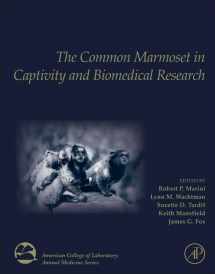
The Common Marmoset in Captivity and Biomedical Research (American College of Laboratory Animal Medicine)
Book details
Summary
Description
The Common Marmoset in Captivity and Biomedical Research is the first text dedicated exclusively to this species,filling an urgent need for an encyclopedic compilation of the existing information. Sponsored by the American College of Laboratory Animal Medicine as part of its authoritative Blue Book series, the book covers the biology,management, diseases, and clinical and research applications of this important species. The common marmoset (Callithrix jacchus) has come of age in the scientific community as a behaviorally complex, cognitively advanced,small, prolific, and easily maintained nonhuman primate with many of the advantages of larger animals, such as macaques, but without the attendant physical and zoonotic risks.
Marmosets are currently being used in diverse areas of inquiry, including vision and auditory research, infectious disease, cognitive neuroscience, behavior, reproductive biology, toxicology and drug development, and aging. The marmoset genome has been sequenced and there is currently an intensive effort to apply gene editing technologies to the species. The creation of transgenic marmosets will provide researchers with a small nonhuman primate model to study a number of poorly understood disorders, like autism.


We would LOVE it if you could help us and other readers by reviewing the book
Book review



